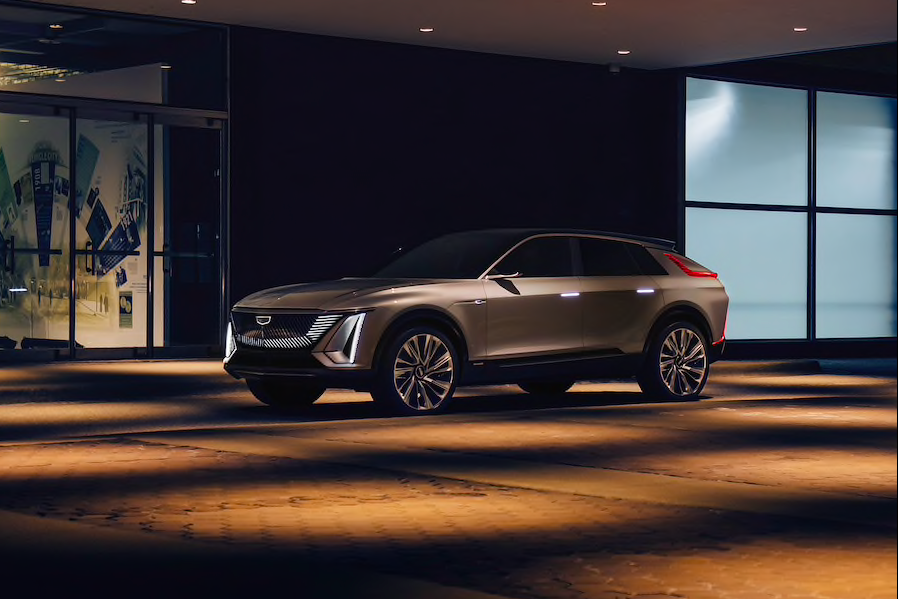
Photo: The all-electric Cadillac Lyriq, which GM says will have a range up to 300 miles per charge; this model is expected to roll out in the first half of 2022.
Later this year, General Motors will launch its first electric vehicles to use the company’s next generation Ultium EV platform. The first two GM releases using the automaker’s battery technology will be its flagship offerings, the GMC Hummer and the Cadillac Lyriq.
Following on from these two models, and because the Ultium platform is modular, GM says it will be able to rapidly build out an extensive range of 30 EVs by 2025, featuring vehicles across all of its brands and vehicle categories.
As these Ultium vehicles roll out, the platform will use familiar lithium-ion battery cells, but GM is already looking ahead to what comes next in battery technology. Last week, during a Washington Post live interview with GM’s president, Mark Reuss, GM announced that it has inked a joint agreement to develop lithium-metal batteries with Singapore-based SES (formerly known as SolidEnergy Systems).
Lithium-metal cells promise to unlock greater potential for EVs, making battery-powered vehicles an increasingly compelling choice. Lithium-metal batteries are lighter than lithium-ion ones and are able to deliver more energy per unit weight and volume. They achieve this by replacing the carbon anode used in a lithium-ion cell, with a lithium-metal anode instead. The lithium-metal anode is able to store more energy, which combined with its lighter weight promises significantly improved vehicle range.
For comparison purposes, GM’s Reuss says while the upcoming Hummer EV will be able to travel 350-plus miles on a lithium-ion equipped Ultium battery; future lithium-metal batteries will allow GM EVs to travel 500 to 600 miles on a single charge.
Furthermore, not only will lithium-metal batteries have the potential to achieve up to double the energy density, Reuss says the new batteries come at 60 percent of the cost of lithium-ion cells, asserting, “it’s a breakthrough.”
The new partnership is moving fast with the two companies planning to build a factory in Massachusetts to build prototypes of the new battery by 2023. What’s more, assuming development is successful, moving to lithium-metal will mesh well with GM’s modular platform approach.
This shift is possible as the Ultium platform was designed from the outset to be “backwards compatible.” When GM unveiled it last year, the company anticipated battery technology would continue to evolve rapidly and that new chemistries would certainly come along. Planning for Ultium to evolve with new battery developments was consequently an imperative for which it was well designed.
As a chemistry, lithium-metal is not new and has been expected for some time to be a promising alternative for vehicle batteries because of its superior performance. So far though, the technology has not reached prime time as it has not proved to be stable enough for safety, nor could it withstand as many charging cycles as lithium-ion batteries.
Already, tweaks to lithium-metal technology appear to be addressing battery cell stability and durability, indicating it will be an increasingly viable and important candidate for next generation vehicle batteries. Successful debugging of lithium-metal technology will be especially welcome as lithium-ion chemistry is beginning to reach the limits of possible improvements to energy density.
The new partnership GM is launching with SES is further evidence of the automaker’s commitment to electric vehicles. Reuss says they are all in on all-electric vehicles and at this point, the company has eschewed plug-in hybrids as a more cautious steppingstone away from gasoline powered vehicles. But will the automaker find customers?
Thankfully, for the company, GM has found customers of the Chevrolet Bolt EV - which has just undergone an update - to be the most loyal to the brand. This bodes well for its stated goal of an all-electric future as Reuss asserts the company has data showing there are many more customers ready to go all-electric.
That being said, he’s aware the automobile remains an emotive purchase and that a culture shift is underway. Reuss says, “Freedom and passion remain important, so GM will need to develop beautiful vehicles and reduce friction points for a very diverse country.”
If, as is anticipated, the next generation of battery technology delivers up to 600-mile range per charge at 60 percent of the cost, that’s got to help with its mission.
Image credit: Cadillac

Phil Covington holds an MBA in Sustainable Management from Presidio Graduate School. In the past, he spent 16 years in the freight transportation and logistics industry. Today, Phil's writing focuses on transportation, forestry, technology and matters of sustainability in business.














